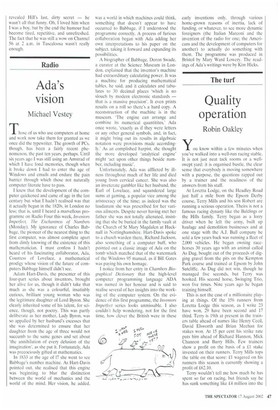Radio
Ada's vision
Michael Vestey
Those of us who use computers at home and work now take them for granted as we once did the typewriter. The growth of PCs, though, has been a fairly recent phenomenon, the past ten years, perhaps. Until six years ago I was still using an Amstrad of which I have fond memories, though when it broke down I had to enter the age of Windows and emails and endure the pain barrier through which those not naturally computer literate have to pass.
I knew that the development of the computer quickened and came of age in the last century but what I hadn't realised was that it actually began in the 1820s, in London no less; that is, until I heard a marvellous programme on Radio Four this week, Inventors Imperfect, The Enchantress of Numbers (Monday). My ignorance of Charles Babbage, the pioneer of the nearest thing to the first computer, was almost complete apart from dimly knowing of the existence of this mathematician. I must confess I hadn't heard of his fascinating collaborator, Ada, Countess of Lovelace, a mathematical prodigy whose vision of the future of computers Babbage himself didn't see, Adam Hart-Davis, the presenter of this four-part series about inventors, brought her alive for us, though it didn't take that much as she was a colourful, insatiably curious, brilliant young woman who was the legitimate daughter of Lord Byron. She clearly inherited some of his talent, for science, though, not poetry. This was partly deliberate as her mother, Lady Byron, was so appalled by her husband's excesses that she was determined to ensure that her daughter from the age of three would not succumb to the same genes and set about 'the annihilation of every delusion of the imagination', as she put it, Fortunately, Ada was precociously gifted at mathematics.
In 1833 at the age of 17 she went to see Babbage's number machine. As Hart-Davis pointed out, she realised that this engine was beginning to blur the distinction between the world of mechanics and the world of the mind, Her vision, he added, was a world in which machines could think, something that doesn't appear to have occurred to Babbage, if I understood the programme correctly. A process of furious collaboration began with Ada adding her own interpretations to his paper on the subject, taking it forward and expanding its possibilities.
A biographer of Babbage, Doron Swade, a curator at the Science Museum in London, explained that the inventor's machine had extraordinary calculating power. It was a machine for producing mathematical tables. he said, and it calculates and tabulates to 30 decimal places 'which is no slouch by modern electronic standards — that is a massive precision'. It even prints results on a roll so there's a hard copy. A reconstruction of the machine is in the museum. The engine can arrange and combine its numerical quantitites,' Ada once wrote, 'exactly as if they were letters or any other general symbols, and, in fact, it might bring out its results in algebraic notation were provisions made accordingly.' As an complished harpist, she thought the more developed 'analytical engine' might 'act upon other things beside number, including music'.
Unfortunately, Ada was afflicted by illness throughout much of her life and died young from cervical cancer. She was also an inveterate gambler like her husband, the Earl of Lovelace, and squandered large sums at gaming, a popular vice among the aristocracy of the time; as indeed was the laudanum she was prescribed for her various ailments. Despite never having met her father she was not totally alienated, insisting that she be buried in the family vault at the Church of St Mary Magdalen at Hucknall in Nottinghamshire. Hart-Davis spoke to a church warden there, Richard Jackson, also something of a computer buff, who pointed out a classic image of Ada on the tomb which matched that of the watermark of the Windows 95 manual, as if Bill Gates was paying his own homage.
I notice from her entry in Chambers Biographical Dictionary that the high-level computer programming language ADA was named in her honour and is said to realise several of her insights into the working of the computer system. On the evidence of this first programme, the Inventors Imperfect series looks unmissable. I also couldn't help wondering, not for the first time, how clever the British were in these early inventions only, through various home-grown reasons of inertia, lack of funding, or whatever, to see more dynamic foreigners (the Italian Marconi and the invention of the radio for one; the Americans and the development of computers for another) to actually do something with them. The programme was produced in Bristol by Mary Ward Lowery. The readings of Ada's writings were by Kim Hicks.






























































 Previous page
Previous page